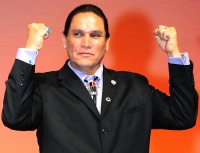
Congress has debated the issue of internet gaming in one form or another for more than 15 years. What began as attempts to prohibit internet gambling in the United States has now turned to legalization efforts. While the debate was relatively slow in 2013 on the federal level, the issue will certainly continue through the remainder of the 113th Congress, and NIGA will remain vigilant to ensure that Indian Country’s voice continues to be heard.
The strength of Indian Country’s position on internet gaming continues to be our unity on the issue. The issue holds great importance to all tribal governments. More than 230 tribes in 26 states use Indian gaming revenues to rebuild community infrastructure, educate Native children, improve health care for our elders, enhance public safety, and much more. The revenues provided by gaming are essential to the ability of tribal governments to care for their citizens.
The major players in the internet gaming debate are now realizing the depth and experience that tribal gaming brings to the table. Indian gaming has created 628,000 jobs for Indians and local communities, and our industry comprises 44 percent of all gaming in the United States. Indian gaming alone is responsible for more than $29 billion in U.S. wages annually. Indian gaming revenues have also saved thousands of American jobs outside of Indian Country, preventing layoffs of teachers, health care workers, fire fighters, police officers and many others.
From the beginning of this debate, NIGA has actively engaged our membership. As chairman, I established the NIGA Executive Committee’s internet gaming and economic development sub-committee. To date, this sub-committee has met dozens of times. Its work resulted in the unanimous position adopted by NIGA’s 184 member tribes in August 2011 that endures in the face of the current internet gaming debate.
NIGA’s internet gaming principles are more than policy recommendations. They are directives from our tribal leadership. As chairman, I have always made it clear that NIGA will never waver from our mission, which is to protect tribal sovereignty and the rights of all tribes to shape their economic future.
Our principles do just that:
1) Indian tribes are sovereign governments with a right to operate, regulate tax, and license internet gaming, and those rights must not be subordinated to any non-federal authority;
2) internet gaming authorized by Indian tribes must be available to customers in any locale where internet gaming is not criminally prohibited;
3) consistent with long-held federal law and policy, tribal revenues must not be subject to tax;
4) existing tribal government rights under tribal-state compacts and IGRA must be respected;
5) the legislation must not open up the Indian Gaming Regulatory Act for amendments;
6) federal legalization of internet gaming must provide positive economic benefits for Indian Country; and,
7) Indian tribes possess the inherent right to opt in to a federal regulatory scheme to ensure broad-based access to markets.
These directives further the federal Indian affairs policy supporting Indian self-determination and the U.S. Constitution’s acknowledgment of the status of Indian tribes as governments.
Internet gaming legalization bills proposed in the 112th Congress included provisions that violated these directives and failed to recognize Indian tribes as governments. Thanks to our work on Capitol Hill, Indian Country’s voice is being heard to a greater extent in the 113th Congress, but we have much work to do.
H.R. 2666, the Internet Poker Freedom Act, makes several improvements over past federal bills to legalize internet gaming. However, NIGA opposes H.R. 2666 as currently drafted.
Positive provisions in H.R. 2666 that could garner tribal government support include Section 104(a)(3) (state prohibitions will “not apply to the acceptance of bets or wagers from persons located within tribal lands…”) and Section 103 (provisions authorizing the National Indian Gaming Commission to work with tribal governments to regulate tribal internet poker).
Unfortunately, H.R. 2666 also includes provisions that violate the principles that tribal governments have united behind. The bill would shut out more than half of the tribal governments from participating in the new industry, and it would authorize the violation of exclusivity provisions in some tribal-state gaming compacts. In addition, while the bill is limited to legalizing internet poker, it is silent on non-poker internet gambling.
NIGA will continue to take the pulse of our member tribes and consult with tribal leaders on this issue. We have several nationwide discussions taking place, the first of which will occur at the Great Plains Indian Gaming Tradeshow in Shakopee, Minnesota on March 31-April 2. This discussion will continue at NIGA’s tradeshow May 11-14 in San Diego.
While we expect 2014 to improve economically, NIGA will continue to focus on using existing gaming revenues to help diversify tribal economies. We are hopeful that in the long term, tribal economies will continue to build upon those aspects that make Indian Country unique.
This includes continued diversification into cultural and environmental tourism, but also very possibly the internet as well. There are very few places in America that people can visit and experience top-flight entertainment while learning about the culture, traditions and history of America’s first people, and the internet is probably millions of peoples’ first introduction to tribes.
We have a lot of work ahead of us, whether it is with maintaining the strength of our existing operations, or working with tribes in efforts to achieve economic sustainability. In 2014, NIGA will continue to work on a united front with tribal leaders along with regional and national Indian organizations to advance the lives of Indian people economically, socially and politically.






